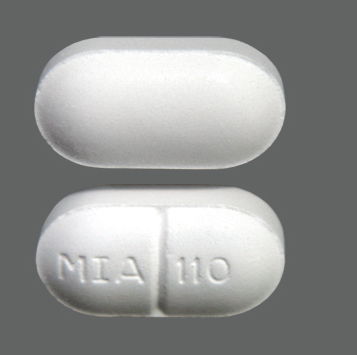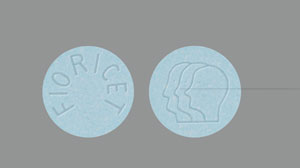It’s recommended to limit caffeine because Fioricet already contains caffeine. The maximum dose of Fioricet is 6 doses per day, which equates to 240 mg of caffeine. For comparison, an 8-ounce cup of coffee contains 95 mg to 165 mg of caffeine.
According to the FDA, 400 mg of caffeine is considered a safe amount for adults that won’t cause dangerous side effects. Too much caffeine can lead to nervousness, shakiness, restlessness, trouble sleeping, and a fast heart rate. If you experience these symptoms, avoid other sources of caffeine and use the lowest possible amount of Fioricet.
Fioricet
Fioricet is a combination medication composed of acetaminophen (Tylenol’s main ingredient), caffeine, and butalbital. It is used to relieve tension headaches and can also be prescribed to treat mild to moderate migraine.
Butalbital belongs to the barbiturate class of medication, which means it is a sedative, or relaxant.1 This makes Fioricet a barbiturate. Because it contains acetaminophen and caffeine, it is also a pain reliever and a stimulant.
Medications containing this combination of ingredients come in capsule and tablet forms, which can be taken by mouth. This combination of medications is also available in generics. Other brand names and formulations include:
- Esgic®
- Fioricet® with Codeine (containing Acetaminophen, Butalbital, Caffeine, Codeine)
- Phrenilin® with Codeine (containing Acetaminophen, Butalbital, Caffeine, Codeine)2
What are the ingredients in Fioricet?
The active ingredients in Fioricet are acetaminophen, caffeine, and butalbital.
How does Fioricet work?
The acetaminophen in Fioricet is a pain reliever, the caffeine works as a stimulant to increase the acetaminophen’s effectiveness, and the butalbital is a sedative that decreases anxiety while causing relaxation and sleepiness. These actions are believed to ease migraine symptoms, but there is limited evidence that barbituates ease migraine symptoms.
What are the possible side effects of Fioricet?
The most common side effects from Fioricet include:
- Drowsiness
- Upset stomach
- Vomiting
- Stomach pain
- Depression
- Lightheadedness
- Confusion3
The following side effects could be signs of allergy or more serious complications and should be reported to health provider immediately:
- Skin rash
- Itching
- Difficulty breathing2
This is not an exhaustive list of all potential side effects of Fioricet.
For more information, consult your doctor or healthcare provider. Patients should talk to their doctor about what to expect with treatment with Fioricet. If you notice any new or worsening side effects, contact your doctor or healthcare provider immediately.
Things to note about Fioricet
Fioricet can be habit-forming, so you should use extreme caution if you decide to take it. Additionally, some people who take barbituates or opioids for extended periods can experience rebound headaches, which can increase in severity. These are also known as MOH, or medication overuse headaches.
Barbituates can cause drowsiness, and their effect can be increased by alcohol use. It is important not to drive or use heavy machinery until you know how this drug affects you.2
Before taking Fioricet, tell your doctor if you:
- Are allergic to any ingredients in the medication
- Are taking blood thinners, antidepressants, antihistamines, or other sedatives like sleeping pills or tranquilizers.
- Are taking pain medications. Many over-the-counter pain relievers contain acetaminophen, and too much of this drug can be harmful.
- Have ever had liver disease, porphyria, or depression
- Are pregnant, plan to become pregnant, or are breastfeeding2
You should begin no medication or supplement without first checking with your health care provider and should let them know of any other prescriptions, OTCs, and herbals you are taking to ensure there are no interactions.



Leave a Reply
You must be logged in to post a comment.